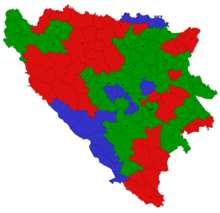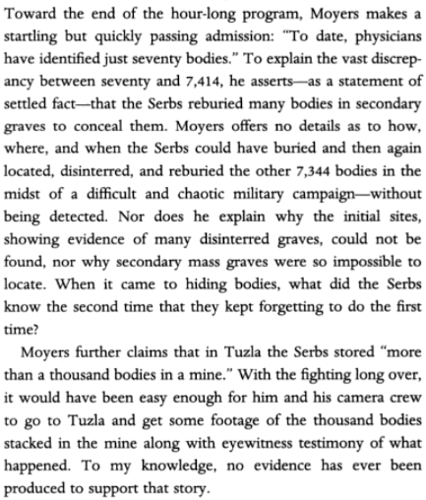There’s a big asterisk on this too, because in early 1992 (after a referendum declaring Bosnia independent which had been boycotted by ethnic Serbs) an agreement to ethnically partition the country was signed by the leaders of the three factions (Bosniak, Croat, Serb). But the Bosniak Izetbegović, who was an opponent of partition and had only signed under pressure, withdrew his signature after a conversation with US Ambassador Warren Zimmerman. NYT article from 1993:
Immediately after Mr. Izetbegovic returned from Lisbon, Mr. Zimmermann called on him in Sarajevo. The Bosnian leader complained bitterly that the European Community and Bosnian Serbs and Croats had pressured him to accept partition.
“He said he didn’t like it,” Mr. Zimmermann recalled. “I told him, if he didn’t like it, why sign it?”
Although some of the architects of American policy in the region defend their actions, a number of major figures now acknowledge errors.
“Our view was that we might be able to head off a Serbian power grab by internationalizing the problem,” said Warren Zimmermann, who was then the American Ambassador to Yugoslavia. “Our hope was the Serbs would hold off if it was clear Bosnia had the recognition of Western countries. It turned out we were wrong.”
In retrospect, Mr. Zimmermann said in a recent interview, “the Lisbon agreement wasn’t bad at all.”
Whoops! But to be fair, the US position was that ethnically partitioning countries is bad (like, “to solve racial tension in the US, why don’t we just partition it into a Black bit, a Hispanic bit and a white bit?” is not exactly a left-wing proposal) and that partitioning a country rather than respecting the existing borders of the constituent republics of Yugoslavia was going to provide a bad precedent as the Iron Curtain was rolled back, in terms of ethnic insurgencies asserting themselves. Like what has happened in Ukraine in the last few years, for example. Also have to remember that this was taking place in a climate of rising Serb nationalism and wars already being fought by Serbia to try to retain control over Yugoslav territory, so the US may have regarded the plan as an unworkable mess which was more certain, in the long term, to lead to Serbia trying to annex Bosnia in its entirety. Like if you look at the proposed map:

Serb areas in red, and Serbia itself is off to the right. You can see how people might look at that and be like “cmon, they are eventually just going to chomp all that space in between”.
So while they should have given the peace deal a go, my impression is that this was just bad decisionmaking from the US rather than an imperial desire to squeeze every drop of land they could out of Belgrade.




